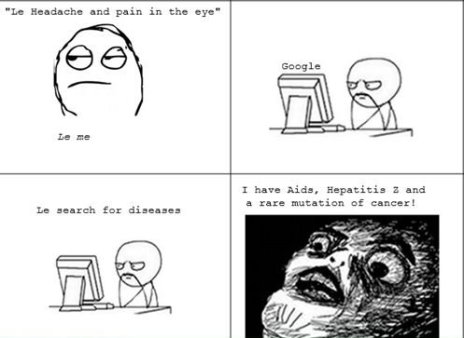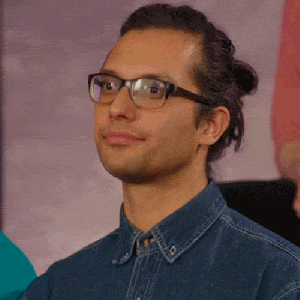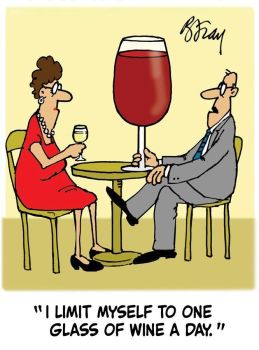We’ve all been at that stage where we’ve felt a teeny bit unwell, and so we Googled our symptoms.
BIG MISTAKE.
The internet usually tells you that you have some type of rare cancer and all of a sudden you’re convinced you’re dying.
You’re nodding in agreement right? Amiright?

So wouldn’t it be easier if the healthcare industry was more prominent on social media? You’re nodding again, yes, you are.
We all know that today’s millennials are highly influenced by opinions posted on social media. And, that they will usually consult social media sites and look at reviews before making decisions regarding university options, travel and clothes… and the list goes on. This influence of social media includes health care decisions.
According to PwC Health Research Institute, 90% of people aged 18 to 24 stated they trust medical info shared on their social feeds. And this is important for healthcare professionals to know, because it is an opportunity to connect with consumers in a new and engaging way. More nodding from you eh?
Furthermore, 41% of people said social media would affect their choice of a specific doctor, hospital, or medical facility. This is important because social media can be used as a vehicle to help control positive and negative word of mouth (WOM). So, for healthcare professionals to attract and retain customers, social media allows them to tune in to what is being said by consumers.

Annnnd, you know those health claims like a glass of red wine a day can reduce cancer, or sitting is just as good as walking to lose weight? More nodding
The terminology used are sensational terms such as “cure”, “miracle” and breakthrough”, which is all misleading. But we generally believe the claims.
Well, what would make sense is, if the healthcare professionals have their own social media accounts where they can dispute the rubbish claims, or even offer some back- up information that the average consumer isn’t privy to.
Boston-based Dr. Kevin Pho who actively engages in Twitter is an example of how to use social media to connect with patients. With close to 150,000 followers, he also uses Twitter as a powerful platform to influence health practices with his original health content, from his blog.

So, my nodding friend, what is the impact for digital marketers?
Well, for starters, those digital marketers that work in the healthcare industry could certainly start by creating social media accounts on behalf of the practitioners. This would be a great platform to interact with patients, and potential patients who are looking for reviews on the firm… etc
It will also allow practitioners to reach the millennials and younger generations who view social media as a legitimate source.
And to take it in the other direction, if digital marketers use words such as “miracle cure”, and “groundbreaking research” and it all ends up being a hoax, well beware. Because eventually it may be a norm for practitioners to be on social media, and if they’re disputing your claims well that’s just embarrassing for you.
What do you think? Have you ever Googled your symptoms? How else would social media help the healthcare industry?


I completely identified myself with your blog, as I am forever checking out symptoms online, looking for quick homemade “miracle – medicines”… My guess is that we are all too busy to go to the doctor so we are trying to “cure” ourselves the quickest way… Your suggestion for digital marketers, working in the healthcare industry, to create social media accounts is a valid one, as it will allow patients to interact with the real professional. However, I am wondering whether doctor may lose their main source of income if patients refer to a website rather than visit their clinic.
LikeLike
Thanks for the comment 🙂
I thinks important to emphasise that a doctor is not going to diagnose someone over social media. Rather social media will allow the practitioner to be remind people to get the flu shot, let people know about any recent outbreaks such as the as the Zika virus, or to give another opinion on “research” aired on Tv.
I think if people are planning to private message the doctor their symptoms and what they should do, then it would be rather useless, as the doctor would request the come to the clinic and get seen properly……
LikeLike
I agree with your article! I definitely think there is a gap in “healthcare online” that should be filled! Some healthcare systems are inefficient and patients have to wait hours before they are able to speak with a doctor. This problem could be solved if doctors or healthcare experts had their own social media page where they could clarify misunderstandings, raise awareness on diseases and it could be a platform where practitioners and patients could interact!
Some apps have been developed such as Healthtap for people to learn more, get immediate help and buy medical products!
LikeLike
Thanks for the comment!
I’d never heard of Healthtap before, so I’ve looked it up, seems like such a great app, and a smart way to get doctors and patients on the same platform.
LikeLike
Honestly, I tend to disagree as I think that social media and internet should not mix with health. By communicating via social media, practitioners are unable to fully judge what may or may not be wrong with the patient and may possibly lead to an incorrect judgement, consequently harming the patient. I’m probably in the minority when I say I don’t Google my symptoms, however in my opinion i think a relationship between health and social media can mostly be harmful.
LikeLike
I definitely understand your concerns!
I thinks important to emphasise that a doctor is not going to diagnose someone over social media. Rather social media will allow the practitioner to remind people to get the flu shot, or inform their followers about any recent outbreaks such as the as the Zika virus, or to give another opinion on “research” aired on Tv.
As you said, for safety reasons, a Doctor will probably not diagnose someone over a social media. The Doctor will most likely tell the patient to come to the clinic to be properly diagnosed.
LikeLike
My physio has a tab on their website where anyone is able to go online and see which appointments are available at any date they want, and able to book an appointment right there and then. From what I have found, GP’s do not have this option and I feel it would be very beneficial for them. They are constantly busy all day and it is always hard to get an appointment as soon as possible. If you need to make an appointment and it is after hours on a Friday, all you need to do is go online and see which appointment is available. and you will know that on Monday you have an appointment, instead of waiting until Monday morning and calling like crazy to try and get an appointment at the last minute ( which is generally unlikely).
LikeLike
I think you make an excellent point here.
Most businesses have the option to make a booking online (even my hairdresser has it!), so why not GPs?
As you said, if you need to make an appointment after hours, you have to call the next morning, which can be quite stressful as everyone else is calling at the same time!
I certainly think this would be a step in the right direction by allowing patients to make bookings online. And of there is an issue with the time they booked, a receptionist can always follow up and reschedule the appointment…….
LikeLike
Yes, of course! I feel like whenever someone begins to tell me their symptoms or even thinking about my own – I go straight to Google. I’m currently sick, and I recently Googled “sharp pain in lower right abdomen, headaches and dizziness” – I swear I got a result of having appendicitis as well as having low white blood cells… IT FREAKED ME OUT. Turns out I was just hungry, and just hadn’t eaten that much that day. Googling online just seems like a more viable option that having to call up the doctors and waiting in line with other sick people, wait, not even to mention having to have the energy to get up and GO to the doctors. I know that they have live bots for almost everything, so it would be a really good option to invest in having GP help online (and not just automated answers like ‘but go to your GP to make sure’… I just revealed that I have also spoken to the WebMD live chat bot…). But anyway, I go to the doctors now as a last resort (like if I’m low-key on the brink of death) – half the time they just prescribe me panadol anyway!
LikeLike
Hahaha!
Yes, I will always Google my symptoms before going to the doctor, going to the Dr is usually a hassle; having to book with the bitchy receptionist, wait for 30mins in the waiting room with screaming and coughing children to finally see the Dr (for like 5mins) and then drive and get the medication…ugh ….I’m stressed just thinking about it.
So if I can simply be told “Shelley, you have a common cold, drink tea, take Panadol, and rest” this would be much, much easier.
Obviously there are medical/legal complications, and we as a society should try and work them out.
For now, I’ll just continue Googling!
LikeLike